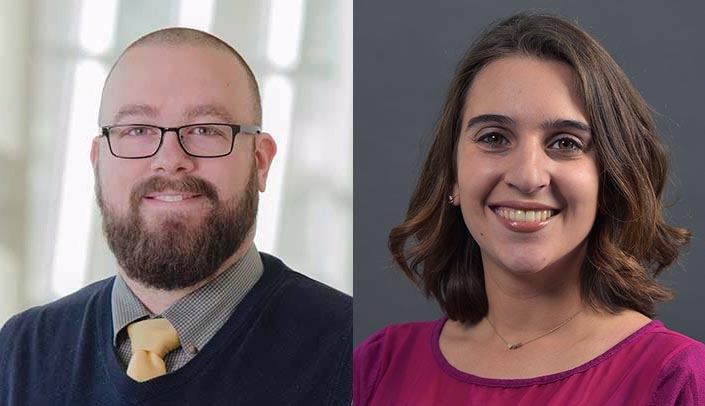UNMC psychologist Jonathon Sikorski, Ph.D., and Alison DeLizza, a pre-doctoral intern in the Munroe-Meyer Institute Department of Psychology, will discuss “Pain is Unavoidable; Suffering is Not” at the next Omaha Science Cafe at 7 p.m. on Sept. 18 at the Slowdown, 729 N. 14th St.
Dr. Sikorski and DeLizza will explore problematic patterns of thinking that make painful situations worse and how to work past them.
Dr. Sikorski is director of wellness education for UNMC, where he provides lectures and trainings on building resiliency, work-life integration and stress management. He teaches within the psychiatry department, offering courses on intellectual and behavioral assessment, therapeutic techniques, wellness, resiliency training, and diversity issues in education.
He has recently received grant funding to develop university-wide wellness e-modules, stress management curriculum, and to establish a biofeedback lab for academic training and research. He has been invited to speak both regionally and nationally on physician wellbeing and burnout.
DeLizza is an intern in the behavioral pediatrics and integrated care rotation in UNMC’s Munroe-Meyer Institute. She completed her master’s degree and doctoral coursework at Western Michigan University in Kalamazoo, Mich.
Her research focuses on understanding mechanisms of action in contemporary behavior therapies, trans-diagnostic factors associated with depression and anxiety, and the use of acceptance and commitment therapy with adolescents. Clinically, she specializes in treating adolescents with internalizing disorders.
This Science Cafe is being held in partnership with the Omaha Community Playhouse and its production of “Fun Home,” a play that runs through Sept. 16 and deals with self-discovery and navigating challenging family dynamics.
Science Cafes involve a face-to-face conversation with a scientist about current science topics. They are open to everyone (21 and older) and take place in casual settings like pubs and coffeehouses. Each meeting is organized around an interesting topic of conversation. A scientist gives a brief presentation followed by a Q-and-A period.
Pizza will be provided for the first 50 people.
